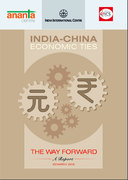Economic ties constitute one of the most crucial areas of the strategic and cooperative partnership between India and China. Both the Asian giants have grown in the post-reform years by increasing their external economic linkages. Currently, India-China trade stands at $70.59 billion, which offers tremendous opportunities for traders and investors of both countries in sectors such as agriculture and food processing, asset management, construction and infrastructure, pharmaceuticals, electronics and information technology, and transport and logistics. Prime Minister Narendra Modi has also highlighted opportunities in railways, smart cities, infrastructure and urban transport for cooperation. For India, there is greater scope for technical and financial collaborations with China in specific “Make in India” sectors like thermal power, renewable energy, railways, construction, ports and media &entertainment. China’s ‘rise’ has however been a mixed blessing for India. While there are serious concerns generated in some quarters, there has been a welcome increase in a number of sections, which see China’s growth as a beneficial opportunity. Arguments in favor of freer access to the Chinese market are being heard more frequently. India–China economic relations have implications not just for bilateral ties but have the potential to shape the economic landscape of the region and the world. There are stark differences in the developmental process followed by India and China in the last 20 years but the problems at hand for both the countries are alike such as income inequality, gender inequality, rural-urban divide, and unemployment issues. Notably, these problems represent themselves differently in both the economies and in all likelihood, their respective domestic economic developments are likely to affect and/or influence India-China bilateral dialogues. On the regional front, India and China are members of BRICS (Brazil, Russia, India, China and South Africa), Shanghai Cooperation Organization (SCO), East Asia Summit, Basic Groups on Climate Change and G20. The positions of both the countries converge on some issues and diverge on others.
Latest
Insights
The Indo-Pacific Economic Framework for Prosperity: Key Opportunities & Concerns for India


The India-United States Partnership for the Global Fight Against Climate Change
News
Letter

Ambassador Sharat Sabharwal, Former High Commissioner of India to Pakistan and Distinguished Visiting Fellow, Ananta Centre

AFPAK DIGEST
Pramit Pal Chaudhury, Foreign Editor, Hindustan Times, and Distinguished Fellow & Head, Strategic Affairs, Ananta
Mr AK Bhattacharya, Editorial Director, Business Standard, Distinguished Fellow, Ananta Centre Editorial Director
Pramit Pal Chaudhury, Foreign Editor, Hindustan Times, and Distinguished Fellow & Head, Strategic Affairs, Ananta
Ambassador Ashok Sajjanhar, Former Ambassador of India to Kazakhstan, Sweden and Latvia; President, Institute of
Ambassador Ashok Sajjanhar, Former Ambassador of India to Kazakhstan, Sweden and Latvia; President, Institute of
India should aim to be a ‘super partner’
December 6, 2022
All of this makes India, potentially, a ‘super partner’ rather than a ‘super power’. A...
Reports
AFRICA DIGEST
Pramit Pal Chaudhury, Foreign Editor, Hindustan Times, and Distinguished Fellow & Head, Strategic Affairs, Ananta
Most
Post
Facebook
Pinterest
LinkedIn




















